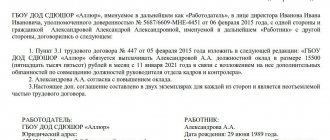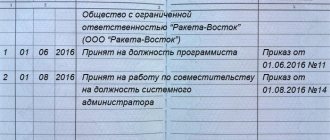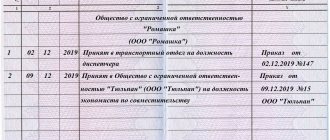In the realities of modern life, there are often situations in which a person performs work duties in two or more places, if time permits. If all these jobs are official (with the conclusion of an employment contract), then we are talking about part-time work. If several types of positions are combined for one employer, the combination is internal, and for different types of positions it is external.
In this case, the main job is considered to be the one where the employee spends the greatest amount of time, and the main sign of the main place of work is the storage of a work book in its personnel department.
An employee naturally spends significantly less time at a part-time job than at his main job. But this does not mean that for this reason he will have to rest for less time. Let's consider how the Labor Code of the Russian Federation regulates the duration of leave when combining positions, what rules exist in this regard, what financial resources are available to part-time workers when receiving leave and compensation and when not receiving it.
Provision rules for external part-time worker
The right of a part-time worker to rest is guaranteed by Article 286 of the Labor Code of the Russian Federation. According to this article:
- part-time workers are entitled to paid vacation time annually;
- Leave for part-time work and the main place of work must be granted simultaneously.
The right to annual paid leave arises for an employee after 6 months of continuous work with a given employer. Before this period, it can only be provided by agreement between the employee and his employer (Article 122 of the Labor Code of the Russian Federation).
However, there is an exception to this rule for part-time workers. Even if the employee has not worked part-time for 6 months, leave for part-time work is granted to him in advance if two conditions are met:
- the employee asks for it; And
- during the same period, the employee takes leave from his main job (Article 286 of the Labor Code of the Russian Federation).
Legislative position of the Labor Code of the Russian Federation regarding part-time work and types of recreation
The Labor Code of the Russian Federation allows employees to perform other duties during the time not occupied by their main work, if they do not contradict their qualifications. This possibility is regulated in Chapter 44 of the Labor Code of the Russian Federation. In particular, the text of the Labor Code of the Russian Federation contains a mandatory requirement for employers to consolidate relations with a part-time worker in an employment contract, which will also include a clause regarding timely departure for the next vacation.
Payment for part-time work is carried out in accordance with the regulations of Art. 285 of the Labor Code of the Russian Federation, the eligibility of going on “part-time” leave is noted in Art. 286, and the issues of vacation payments are regulated by Chapter 19 of the Labor Code of the Russian Federation, which considers the issues of vacations for any form of employment.
Is it necessary to take into account the order?
Typically, vacations are provided in accordance with the schedule approved by the organization in the order of priority.
However, in the case of part-time workers, the rule on priority established by Art. 123 of the Labor Code of the Russian Federation, does not work. Part 1 art. 286 of the Labor Code of the Russian Federation allows a part-time employee to rest at a time convenient for him in order to combine it with rest at his main place of work.
Expert opinion
Labor Lawyer Olga Smirnova
The basis for exercising the right to an extraordinary grant of leave to a part-time worker will be a certificate or an extract from the leave schedule at the main place of work, confirming that the employee intends to rest on the same dates.
How is payment calculated?
For persons engaged in part-time work, payment of vacation pay
periods is carried out according to general rules. Funds are paid from the budget of the organization or enterprise. The exception is periods taken at your own expense, that is, without payment.
If the vacation period at an additional workplace is significantly shorter than the main vacation, the employee may qualify for payment of monetary compensation for unused days.
Such compensation will only be provided with the consent of the employer. Otherwise, the employee will receive additional days of rest without pay, so that the total number of days issued corresponds to the length of the vacation period at the main workplace.
Simultaneous provision - a right or an obligation?
In accordance with the provisions of the Labor Code of the Russian Federation mentioned above, an employee has the right to register time off simultaneously at both places of employment. However, the law does not oblige the employee to use this opportunity. The following rules apply:
- if an employee has taken leave at his main job, he can take it at a part-time job or not use this opportunity (in this case, leave from his main job and part-time leave will be granted at different times). Then the employee does not have the right to take advantage of preferential conditions at the place of part-time employment;
- If an employee has taken leave while working part-time, he is obliged to take it at his main place of work.
Expert opinion
Labor Lawyer Olga Smirnova
This position is supported by judicial practice. Thus, according to the Appeal ruling of the Novosibirsk Regional Court dated September 1, 2015 in case No. 33-7502/2015, the preferential conditions for granting vacations in Article 286 of the Labor Code of the Russian Federation are aimed at exercising the right to rest by a part-time employee. This rule provides for the emergence of an obligation to take leave at both places of employment only if the employee exercises the right to rest at his/her place of employment. The opposite norm is not established by law. Therefore, leave from the main place of work does not require simultaneous departure on part-time leave.
In case of violation of rights
If an employer refuses to grant leave to a part-time worker as requested, this may be a cause for complaint. Initially, the employee can write a statement addressed to the head of the organization, indicating the fact of violation of his rights. If the manager does not take action, he can contact the State Labor Inspectorate.
If a violation of an employee’s rights to vacation is confirmed, very sensitive fines follow (for an organization - 30-50 thousand rubles and up to 70 thousand rubles for a repeated violation).
If the refusal to take leave at a combined location caused financial losses or caused moral damage, for example, you had to cancel a planned trip, then this may be grounds for a lawsuit.
Internal part-time leave
If you work part-time in the same organization, the rules for granting leave do not change. An employee has the right to take both vacations at the same time, and if there are not enough days on a part-time basis, receive them without pay.
It should also be taken into account that in the case of internal part-time work, the same employer already has all the necessary documents confirming the planned dates of rest. Therefore, the employee is not required to additionally provide an extract from the vacation schedule at the main place of employment as a basis for exercising his right to simultaneous rest during the same period.
How do part-timers get paid for vacation?
The same as for key workers - these issues are regulated by the same article of the Labor Code of the Russian Federation. Vacation amounts are calculated based on average daily earnings. For obvious reasons, for part-time workers the amount will be less than for main workers, since they work fewer hours per day, and wages still depend on output.
Unused vacation days are subject to monetary compensation in the same way as for main employees. If there is an overexpenditure of the allotted days taken in advance for rest, then upon dismissal the amount for them will have to be withheld.
NOTE! The terms of vacation payments at different jobs do not differ - the employee must receive the funds due to him three days before the start of the vacation.
Changing the vacation schedule
Due to the extraordinary procedure for providing vacation to part-time workers, it is not necessary to include information about them in the vacation schedule.
Based on the certificate provided by the employee or an extract from the vacation schedule from the main place of work, such changes can be made at the request of the employer. But there is no rule obliging this to be done in the law. There is no practical point in making such changes: regardless of the content of the vacation schedule, the employer of a part-time worker will have to provide him with vacation simultaneously with his main job.
Each of the part-time employees' vacations when working on an internal part-time basis is formalized by its own order on its provision.
What to do if your employer does not allow you to go on vacation?
The actions of an employer who refuses to provide leave to a part-time worker, as well as refusal to provide it at a time convenient for the part-time worker, can be appealed to the labor inspectorate or the prosecutor's office. To do this, the employee needs to prepare and submit a written statement describing the circumstances that served as the basis for filing a complaint. The application must also include information about yourself and information about your employer. You can send a complaint by mail, electronically, or submit it to the office of the relevant authority yourself.
In any case, when the rights of an employee are violated, he can also seek judicial protection. At the same time, it is required to comply not only with labor law, but also with civil law.
Other types of holidays
In addition to the annual paid one, a part-time worker has the right to other types of leaves guaranteed by labor legislation. This follows from Art. 287 Labor Code of the Russian Federation.
Maternity leave
For natural reasons, maternity leave is issued at all jobs at once. A sick leave certificate confirming your stay on maternity leave must be issued in several copies, one for each employer.
The place of maternity payments depends on which employer paid insurance premiums for the employee and for what period. If both the main employer and part-time employer have paid insurance premiums for the last two years, you can receive payments in two places.
Training
According to Part 1 of Art. 287 of the Labor Code of the Russian Federation, study leave is granted to an employee only at his main place of work. At the place of part-time employment, this issue will have to be resolved by agreement with the employer. To release an employee (including at his own expense) in this situation is the right, but not the obligation of the employer.
Additional
Additional leave for work in the Far North and equivalent areas (Article 321 of the Labor Code of the Russian Federation) is not provided to part-time workers. This follows from Part 1 of Art. 287 Labor Code of the Russian Federation.
Additional rest time for other reasons is provided to part-time workers in the general manner, as at the main place of work.
We hope you found this article useful. The article contains information about general rules of law and does not replace legal advice. Contact an attorney for an answer to your specific question.
Vacation for a part-time employee.
The Labor Code of the Russian Federation does not prohibit, in cases specified by law, or simply by mutual agreement with the employer, working at an enterprise not full time, but for several hours, that is, working part-time, for example, part-time.
The salaries of such employees are calculated and paid depending on the amount of time worked. But they are provided with vacation in the same way as those employees who work full time.
It might be interesting!
Does an employer have the right to reduce wages?
Decor
Let's first consider registering a vacation for an internal part-time worker:
- The employee writes a leave application for both positions at once or two separate ones for each of them. The application indicates its start and end dates.
- An order is issued in form T-6a (if both are issued at the same time) or two orders in form No. T-6 (if they are issued separately).
- Appropriate entries are made in the vacation schedule.
The leave of an external part-time worker is processed in a similar way, but all documents are required in one copy.
Since leave for a part-time job in another organization must be provided to the employee at the same time as in the original position, the employer has the right to require confirmation or provide it simply upon application.
Proof of provision can be:
- certificate from the main place of work;
- copy of the order;
- extract from the vacation schedule for external and internal part-time workers.
Thus, as you may have already noticed, the answer to the question: “Should I include external part-time workers in the vacation schedule?” - affirmative.
What is part-time work
According to Art. 282 of the Labor Code, part-time work means that an employee performs other paid work under the terms of an employment contract in his free time from his main job.
According to Art. 60.1 of the Labor Code, part-time work means:
- Work under two employment contracts with one employer (the so-called “internal part-time worker”).
- Work under two employment contracts with different employers (the so-called “external part-time worker”).
According to Art. 282 of the Labor Code, employment contracts for part-time workers can be concluded with an unlimited number of employers, if this does not interfere with the performance of the employee’s job duties.








